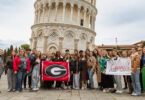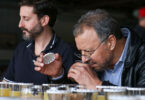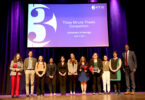Athens, Ga. – Every Monday afternoon, a group of University of Georgia freshmen and sophomores gather to discuss the latest trends in research pedagogy or listen to guest lecturers about their academic interests. These seminars are part of the support network that the Honors Program’s Center for Undergraduate Research Opportunities provides the participants in its Apprentice Program.
The 30 undergraduates, paired with UGA faculty research mentors representing various disciplines, spend 10-12 hours a week on individual research projects. The seminars give the students an opportunity to build their own community of scholars as they compare notes about each other’s experiences, learn research techniques and trends, and improve their writing and critical thinking skills.
First-year apprentice Christine Akoh says one of the highlights of the program has been conducting advanced microbiology research with real-world applications before taking the introductory course. Working in the laboratory of infectious diseases professor Eric LaFountaine, Akoh’s project involves purifying a specific protein of the bacterium Burkholderia pseudomallei with the potential for use in future vaccine developments. The bacterium is classified as a potential bioterrorism agent by the Centers for Disease Control and Prevention.
“In most introductory science courses, it is often times hard to apply what you learn to the real world,” said Akoh, a biological science major from Athens. “I think that my experience with CURO will allow me to better understand what I will be learning in my future science classes, especially the classes with no laboratory component.”
Freshman Michael Burel, who received a first glimpse of the CURO Apprentice Program during a visit to CURO’s annual spring undergraduate research symposium in March, finds the support system and teamwork approach one of the best benefits of the program. Burel is an undergraduate researcher in the laboratory of Steve Stice, GRA Eminent Scholar in Reproductive Physiology.
“The CURO apprentice program offers each and every person involved unprecedented support,” said Burel, a cellular biology major from Acworth. “The apprentices can network about their own projects, and the faculty is encouraging and infinitely supportive. Everyone has everyone else to lean on.”
Within that support system structure, the apprentices receive additional encouragement and guidance from their teaching assistants-previous apprentices who lead small group discussions and talk about their own experiences with the program. Cleveland Piggott, one of three teaching assistants, says he hopes the students he mentors retain the interview and presentation skills they learn during the two-year program. He says he has used those in his own experiences, especially studying under the guidance of faculty research mentors and cellular biologists Marcus Fechheimer and Ruth Furukawa.
“Accepting the offer to be a CURO apprentice was the best decision I made coming into college,” said Piggott, a junior biology and psychology major from Suwanee. “I’m grateful to give back to the program and help make this an invaluable experience for all the students.”
Freshmen chosen for the Apprentice Program may continue through their sophomore year if they maintain a minimum 3.4 GPA and receive a satisfactory performance review.
For more information about the CURO Apprentice Program, see http://www.uga.edu/honors/curo.
The 2008 CURO apprentices are:
Name Hometown Major(s)
First-year apprentices
Christine Akoh Athens biological science
Amarachi Anukam Athens biology
Michael Burel Acworth cellular biology
Jaharris Collier Oglethorpe biology
Craig Hayes Conyers philosophy, cellular biology
Kema Hodge Lithonia advertising
Dillon Horne Loganville comparative literature, philosophy
Shelby Hipol Boxborough, Mass. advertising, art history
John Hobgood Marietta mathematics
Francisco Marrero Columbus chemistry, economics
Amanda McKenley Snellville economics
Patricia Mitchell Tucker chemistry
Akanksha Rajeurs Roswell biochemistry
Al Ray III Lithonia biology
Donald Snyder Albany political science, business administration
Theodore Story Byron Undecided
Second-year apprentices
Kelli Canterbury Hampton English
Opeoluwa Fawole Lawrenceville microbiology
Marcus Hines Albany cellular biology, microbiology
Jackie Lastra Marietta chemistry, psychology
Jasmine Mathis Statesboro mathematics education
David Mitchell Fayetteville finance, accounting
Muktha Natrajan Martinez genetics, ecology
Alex Orellana Suwanee art
Elizabeth Pollak Statesboro biology, broadcast news
Joseph Rimando Warner Robins microbiology
Aalok Sanjanwala Cumming biology
Giridhar Subramanian Marietta international affairs, marketing
Brian Watts Douglasville ecology
Laura Wynn Dunwoody German, business
The 2008 CURO teaching assistants are:
Name Hometown Major(s)
Cleveland Piggott Suwanee biology, psychology
Darryl Tricksey Atlanta environmental health science
Leilah Zahedi Alpharetta biology, psychology







